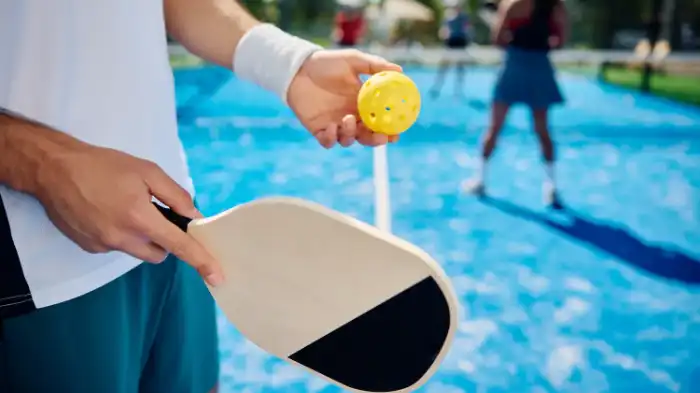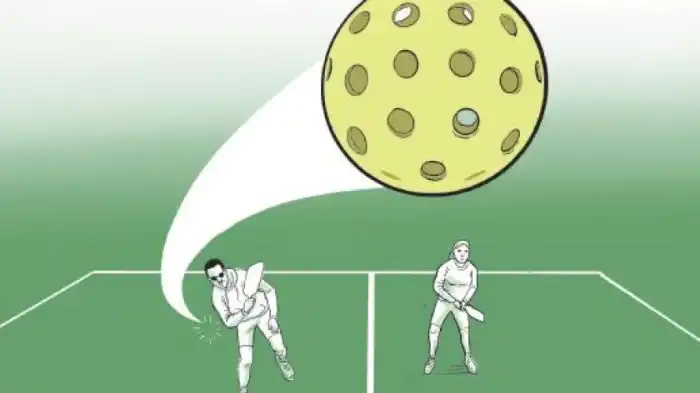Pickleball is a relatively new sport that has been rapidly gaining popularity in recent years. It is a paddle sport that combines elements of badminton, tennis, and table tennis. With its distinctive name and increasing popularity, a common question that arises is, “Is Pickleball Loud?”
In this blog post, we are going to discuss the overview regarding the sound of this sport. Then, we are going to explain how you can determine whether pickleball is loud or not and how to address the pickleball noise concerns. Additionally, we are going to describe a few myths regarding whether the sound of pickleball is loud or not.
Sound of the Pickleball Game
When you first step onto a pickleball court, you may be surprised by the sound of the game. Pickleball is played with a paddle made of graphite or composite materials, and a plastic ball with holes. When the ball makes contact with the paddle, it produces a distinctive popping sound. This sound is amplified by the acoustics of the court and can be quite noticeable.

Furthermore, the nature of pickleball gameplay also contributes to the overall sound. The sport is played on a smaller court compared to tennis, which means players are closer together. As a result, the sound of players moving, hitting the ball, and exchanging shots can create a significant noise level.
Pickleball Noise Levels
Studies have shown that pickleball generates an average noise level of around 75-85 decibels (dB) during normal gameplay. This is roughly equivalent to the sound of heavy traffic or a vacuum cleaner. While it may seem loud in comparison to everyday activities, it falls well within the range of acceptable noise levels.
However, it is important to note that certain factors, such as the type of paddle used, the power behind the shots, and the skill level of the players, can influence the decibel levels. Competitive games with highly skilled players and powerful shots may produce higher noise levels compared to casual recreational play.
How to Determine Whether Pickleball Is Loud or Not?
Perception of Noise
One important factor to consider is the perception of noise. Some individuals may find the sound of pickleball to be loud, while others may not perceive it as such. Personal preference, sensitivity to noise, and prior experience with sports can influence how individuals perceive the noise level.
In addition, the surrounding environment plays a crucial role in the perceived noise level. Indoor pickleball courts tend to have greater reverberation and echo, which can enhance the sound and make it seem louder. Conversely, outdoor courts may have more open space and natural dissipation of sound, leading to a perceived lower noise level.
Quantifying the Sound
To determine whether pickleball is truly as loud as some claim, it is essential to examine quantifiable data. Sound measurements have been conducted in various pickleball facilities to assess the noise levels accurately. These measurements typically involve the use of sound level meters and decibel readings.
Guide to Addressing Pickleball Noise Concerns
Addressing pickleball noise concerns is essential for maintaining good relations with neighbors and the local community. Here’s a comprehensive guide on how to tackle this issue:
Understanding the Concerns:
First, it’s crucial to recognize the concerns related to pickleball noise. Common complaints include the sound of the ball hitting the paddle and the court surface, as well as players’ voices. Understanding the specific sources of noise will help you address them more effectively.
Community Dialogue:
Start a conversation with your neighbors and the local community. Explain your love for pickleball and your commitment to being a considerate neighbor. Listening to their concerns can lead to constructive solutions.
Set Playing Hours:
Establish designated playing hours to limit noise during times when it’s most likely to be disruptive. For instance, avoid early morning or late evening sessions.
Sound-Reducing Equipment:
Invest in sound-reducing equipment. Specialized paddles, balls, and court surfaces designed to minimize noise are available. While they may be more expensive, they can significantly reduce the impact on the surroundings.

Acoustic Barriers:
Consider adding acoustic barriers or sound-absorbing materials around the court. These can include fencing, noise-reducing curtains, or wall panels. They help contain the sound within the playing area.
Choose Court Locations Carefully:
If possible, position the court away from residential areas, or consider building a soundproof enclosure around the court.
Community Courts:
Encourage the establishment of community pickleball courts in less residential areas, such as parks, community centers, or sports complexes. This can help distribute the noise impact and provide a dedicated space for players.
Local Regulations:
Familiarize yourself with local noise ordinances and regulations. Ensure that your pickleball activities comply with these rules. If necessary, work with local authorities to find solutions.
Modify Playing Techniques:
Educate players on techniques that reduce noise impact, such as softer shots, controlled ball placement, and minimizing unnecessary shouting or loud conversations.
Monitor Noise Levels:
Use sound level meters to monitor noise levels during play. This can help you identify the loudest elements and work on reducing them.
Regular Maintenance:
Keep the court surface in good condition. Regular maintenance can prevent excessive noise caused by uneven or damaged surfaces.
Good Sportsmanship:
Promote good sportsmanship among players, emphasizing respect for neighbors and the community. Encourage players to be mindful of their behavior and noise levels.
Engage in Community Events:
Participate in community events or volunteer for local causes to show your commitment to being a responsible and considerate neighbor.
Remember that addressing pickleball noise concerns should be a collaborative effort, involving the players, the community, and local authorities. By working together, it’s possible to enjoy this exciting sport while minimizing its impact on those around you.
Myths Regarding “Is Pickleball Loud?”
Despite concerns, there are several reasons to believe that the noise generated during pickleball matches is not as excessive as some claim. Let’s examine some common misconceptions:
Myth 1: Pickleball is Louder than Traditional Racquet Sports
Contrary to popular belief, pickleball is not necessarily louder than other racquet sports such as tennis or badminton. The sound of a pickleball hitting a paddle is indeed distinct, but the overall noise level is similar to that of other racquet sports. It is the perception of the sound that may be amplified due to the hollow construction of the plastic ball used in the game.
Myth 2: Pickleball Noise is Constant and Unbearable
While pickleball matches can be energetic and intense, the noise generated is not a continuous, unbearable racket. Like any sport, there are moments of increased intensity, but overall, the noise level fluctuates throughout the gameplay. Players have periods of rest between points, allowing for brief reprieves from the sound.
Frequently Asked Questions
The name “pickleball” comes from the sport’s co-inventors and their family dog, Pickles. However, the loud noise often heard during pickleball games is actually due to the paddle hitting the plastic ball, not the origin of the sport’s name.
The loud noise in pickleball games is not an exaggeration. Due to the sport’s unique combination of a plastic ball and solid paddle, the impact creates a distinctive “pop” sound that can be quite loud, especially in a quiet setting.
Currently, there are no specific regulations or modifications aimed at reducing the loud noise in pickleball. However, players may choose to play with quieter paddles that have a softer surface, which can help to dampen the noise to some extent, though it may slightly affect the gameplay experience.
Yes, hosting community events or workshops on noise management can be an effective way to create awareness and bring the pickleball community and neighbors together to work on solutions collaboratively.
Conclusion
In conclusion, the question, “Is Pickleball Loud?” is a valid concern that both enthusiasts and the community need to address. While pickleball generates a distinct popping sound due to the plastic ball and solid paddle, it falls within acceptable noise levels when managed appropriately. The perception of noise varies among individuals, and open communication is essential to finding common ground.
By implementing practical solutions, such as designated playing hours, sound-reducing equipment, and community dialogue, we can enjoy the exciting sport of pickleball while respecting the peace and quiet of our neighbors. Remember, it is possible to harmoniously coexist with this sport, finding the right balance between the thrill of the game and the tranquility of the community.

